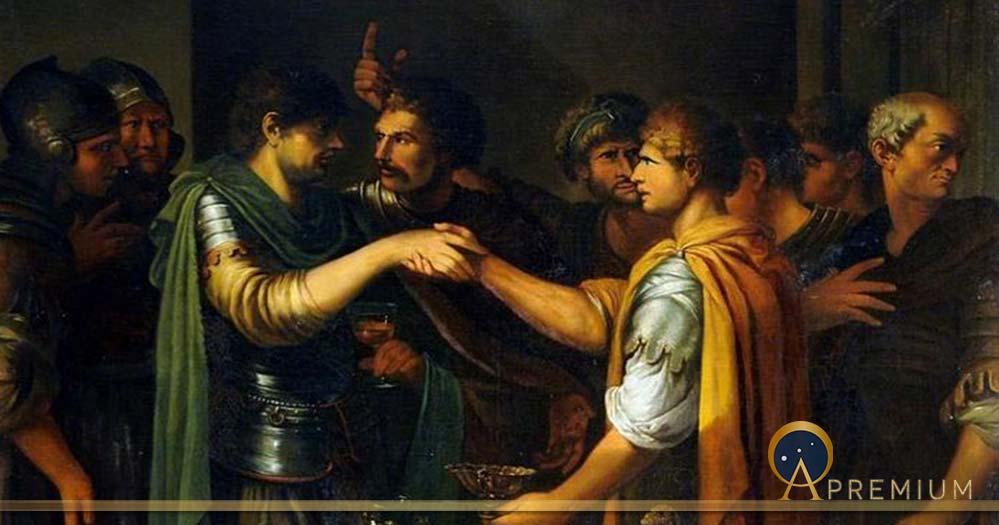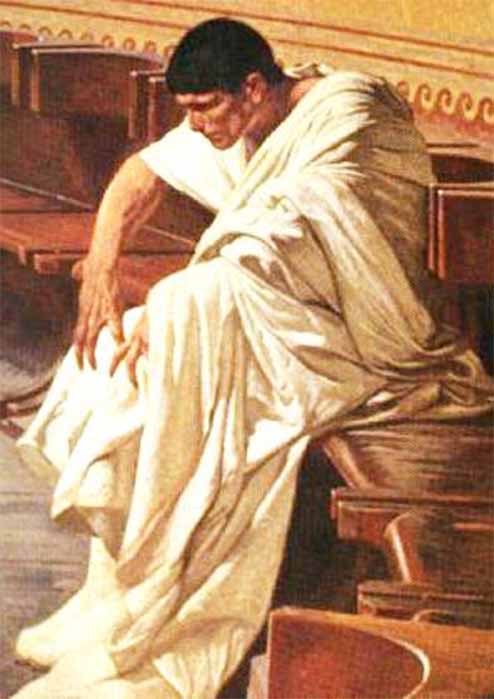Catiline’s Ambition: Born And Bred For Roman Consulship
L. Sergius Catilina (106 to 62 BC), or Catiline, who eventually led a failed revolt against the Roman Republic, embodied the virtues and vices of members of his class and generation. Catiline was neither a villain as depicted by Cicero or Sallust, nor a principled popularis (someone who advanced popular causes opposed by the elite) portrayed by some historians. Nor was he a puppet of more prominent figures such as Crassus or Caesar or a bogeyman of Cicero’s imagination. In short, Catiline was one of the Sullani (a follower of Sulla); Catiline was a conservative who was as ambitious as Sulla, but not as lucky. Catiline’s oldest political supporter was the princeps senatus (leader of the senate) Q. Lutatius Catulus who was perhaps the most prominent of the conservative Sullani (optimates). Catiline’s military experience seems always to have been under commanders who were Sullani.
Detail of Catiline in Cesare Maccari's fresco in Palazzo Madama (Public Domain)
There is no evidence that Catiline espoused any popularis (reform) programs during his first campaign for the consulship. Indeed, it was unlikely that Cicero would have considered combining with Catiline in the 64 BC-consular elections had the latter been a popularis, since Cicero was a conservative at heart. It was only after Catiline’s defeat in the consular election for 63 BC that, disheartened by his failure to win when competing with the novus homo Cicero, he began to support popularis programs. Even then, however, he focused primarily on debt reform and relief for the Sullan veterans (his former comrades in arms) who had been given farms in Etruria by Sulla, but who had fallen on hard times for various reasons. Catiline may have advocated some kind of agrarian reform in his second run for the consulship.
It was a second defeat which Catiline attributed to Cicero’s chicanery and to widespread bribery by the successful optimate candidates that led him to the path of rebellion. Catiline did not take up arms to lead a social revolution. Rather, he tried to seize by force that which he believed had been unfairly denied to him. Had he succeeded in his second campaign for consul or in his efforts to seize control of the Republic, he would have advanced the debasement of the currency and some kind of agrarian reform but nothing more. Catiline was driven by pride and ambition, not social philosophy. He could not accept defeat.
Like this Preview and want to read on? You can! JOIN US THERE ( with easy, instant access ) and see what you’re missing!! All Premium articles are available in full, with immediate access.
For the price of a cup of coffee, you get this and all the other great benefits at Ancient Origins Premium. And - each time you support AO Premium, you support independent thought and writing.
Extract from Catiline; Rebel of the Roman Republic
James T. Carney is graduate of Yale College and the Yale Law School. In his semi- retirement, he has returned to his first love- history with a specialization in the American Civil War and the Last Century of the Roman Republic. He is the author of a biography of L. Sergius Catilina entitled Catiline; Rebel of the Roman Republic
Top Image: The Oath of Catiline, by Joseph-Marie Vien (1809) (Public Domain)
By: James Carney

















